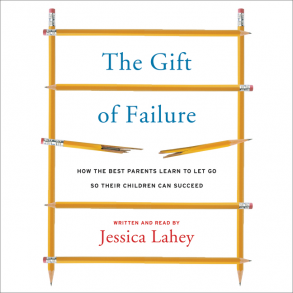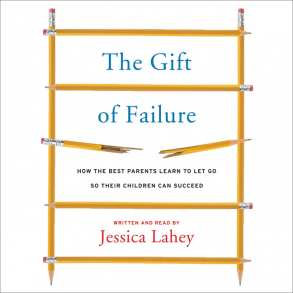

Popular ideas about appropriate parent-child relationships in the U.S. have changed dramatically over the last few centuries and even in the last few decades. Most notably, Lahey argues that children have gone from being seen as “profitable to priceless” and parents are rightfully worried about the ways in which their parenting can adversely impact their children. She suggests that, to the extent possible in today’s hectic and competitive world, parents allow their children to have a childhood filled with carefree play, exploration, and indeed failure.
We all learn best, Lahey argues, when we are intrinsically motivated to learn. One notable and well-institutionalized violation of this principle is grading school work. Grades can undermine motivation and long-term learning. Parents can help counteract the damaging impact of grades by encouraging children to focus on setting and striving towards personal goals, rather than focusing primarily on grades. Small failures in school, when the stakes are relatively low, can help children avoid larger failures later. Parents can help by modeling for their children how to learn from failure and by teaching them a growth mindset, or the idea that with effort we can improve our skills and ability. They can help children understand the consequences of mistakes, provide feedback about challenging situations, provide emotional support when students encounter failure, praise effort towards addressing challenges, and make sure children know they are loved unconditionally.
The damage from protecting kids from failure is cumulative. On the other hand, when parents afford their children autonomy, the children are more likely to learn, explore, and stay focused and organized. Parents can help their children be autonomous in a number of different realms. Children should be expected to contribute to household work. Although parents can do these chores faster or better, children should understand that they are responsible for helping to maintain the place where they live. Parents should avoid interfering with children’s play and friendships as much as possible. Negotiating playground squabbles, resolving sibling disputes, and experiencing adolescent friendships grow and wane help children develop interpersonal skills that will be beneficial. Parents should avoid pressuring kids about their athletic performance or criticizing coaches and referees. Recently, parent-teacher relationships have eroded, but parents can support their children’s autonomy and learning when they show their children that they trust their teachers, have open communications with the teachers, model enthusiasm for learning (rather than drive for perfection), and encourage students to advocate for themselves to their teachers. Parents of college students should allow and require their children to be almost entirely autonomous, while they continue to show interest and support.
Two skills that undergo significant development during adolescence are executive functioning, or our ability to manage ourselves and our mental resources, and working memory, our ability to maintain and manipulate information in our mind. Parents and teachers can help shape adolescents’ environment to compensate for their not yet fully developed abilities by teaching students to notice the behaviors that proceed acting impulsively, giving students time to transition between activities, keeping a calendar, providing predictability in the teen’s life, writing instructions, setting clear expectations, teaching time management, and teaching active listening. They can also help children get sufficient sleep and remain hydrated and well-fed.
Throughout The Gift of Failure Lahey acknowledges that letting students fail can be gut-wrenching, but she maintains that it is worth it. At one point as a teacher she realized that, “all of that [student] failure, failure that nearly gave me an ulcer, resulted in a great learning experience for the students.” With the advice in this book and discipline on the part of teachers and parents to allow their children to fail, children may begin to experience more failure, more learning, and ultimately more success—hopefully with fewer parent and teacher ulcers.
Lahey, J. (2015). The Gift of Failure: How the Best Parents Learn to Let Go So Their Children Can Succeed. New York, NY: Haper Collins Publishing Inc.




